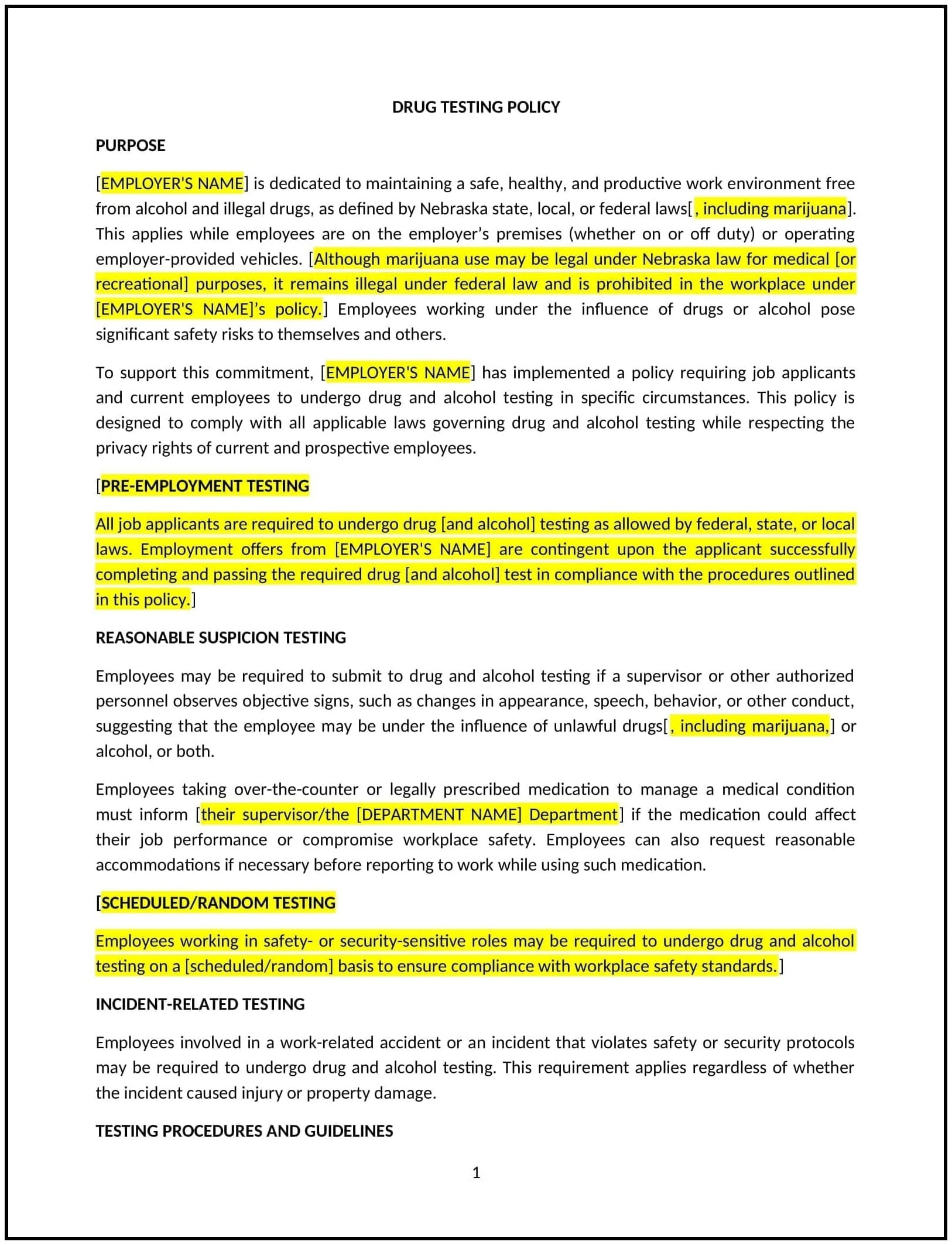Got contracts to review? While you're here for policies, let Cobrief make contract review effortless—start your free review now.

Customize this template for free
Drug testing policy (Nebraska)
A drug testing policy helps Nebraska businesses outline their approach to testing employees for the use of illegal drugs, controlled substances, or alcohol. This policy sets guidelines for when drug testing will be conducted, how tests will be administered, and the consequences for failing a drug test. It is designed to ensure a safe, productive work environment, reduce workplace accidents, and maintain legal and regulatory standards regarding drug use in the workplace.
By adopting this policy, businesses in Nebraska can help prevent workplace drug use, ensure employee safety, and promote a healthy, compliant workforce.
How to use this drug testing policy (Nebraska)
- Define the purpose of drug testing: Clearly state the reason for conducting drug tests, such as ensuring workplace safety, meeting legal requirements, or maintaining a drug-free work environment. Explain how testing contributes to a safe and productive work environment.
- Specify testing types: Outline the types of drug tests that may be used, such as pre-employment screening, random testing, reasonable suspicion testing, or post-accident testing. Ensure that employees are aware of when and why each type of test may be conducted.
- Set testing procedures: Describe the process for drug testing, including how tests will be administered, where they will take place, and who will conduct the tests. Ensure that procedures are consistent, confidential, and non-discriminatory.
- Define prohibited substances: List the substances that are prohibited by the policy, including illegal drugs, alcohol, prescription medications (when misused), or any substance that impairs an employee’s ability to perform their job safely.
- Outline the consequences of failing a test: Specify the actions that will be taken if an employee fails a drug test, such as disciplinary action, suspension, mandatory counseling or treatment programs, or termination. The policy should clarify the potential outcomes for different types of violations.
- Address confidentiality: Emphasize that drug testing results will be kept confidential and will only be disclosed to individuals involved in the testing process or those who need to know within the organization.
- Provide for employee assistance: Offer resources or referrals for employees who may need help with substance abuse issues, such as Employee Assistance Programs (EAPs), counseling, or rehabilitation services.
- Review and update: Periodically review and update the policy to ensure it aligns with Nebraska laws, federal regulations, and any changes in business operations or employee needs.
Benefits of using this drug testing policy (Nebraska)
This policy provides several benefits for Nebraska businesses:
- Promotes workplace safety: Drug testing helps ensure that employees are fit to perform their duties and reduces the likelihood of workplace accidents caused by impaired employees.
- Increases productivity: A drug-free workplace fosters a more focused, efficient workforce, contributing to higher productivity and better overall performance.
- Reduces legal and liability risks: A clear drug testing policy helps businesses comply with regulations and protects them from legal claims or liabilities associated with drug use in the workplace.
- Supports employee well-being: Offering resources like Employee Assistance Programs (EAPs) encourages employees to seek help for substance abuse issues, fostering a supportive and caring work environment.
- Enhances company reputation: A drug-free workplace policy demonstrates the business’s commitment to maintaining a healthy, safe, and professional environment, which can attract both clients and top talent.
Tips for using this drug testing policy (Nebraska)
- Communicate the policy clearly: Ensure that all employees are aware of the drug testing policy, the reasons behind it, and the specific procedures. Include the policy in employee handbooks and during onboarding.
- Be consistent: Apply the policy uniformly to all employees to avoid potential claims of discrimination or unfair treatment. Ensure that drug testing is carried out in a standardized and objective manner.
- Train managers and supervisors: Provide training for managers and supervisors on how to identify signs of impairment and handle reasonable suspicion testing effectively, while respecting privacy and confidentiality.
- Monitor effectiveness: Regularly assess the effectiveness of the drug testing policy and review employee feedback to make any necessary adjustments to the program.
- Stay informed about legal requirements: Keep the policy up to date with any changes in Nebraska state law or federal regulations regarding drug testing and workplace safety.